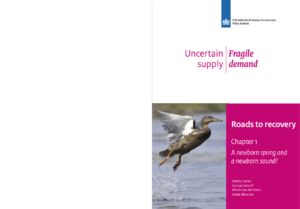Roads to recovery, chapter 1: A newborn spring and a newborn sound?
- The Great Recession has struck hard in industrialised countries: a permanent loss of some 6% of GDP, high unemployment, exploded private and public debts.
- The economy has not lost its resilience, growth potential is unaffected. Uncertainty is explored in Moderate Recovery and Accelerated Recovery.
- Recovery will take time, threatened by weak demand, which is explored in Delayed Recovery.
After a long crisis there is hope on the horizon. The Great Recession began in 2008 with a financial crisis and was followed in 2011 by a euro crisis. During the crisis, the Dutch economy suffered damage that will only partially be recovered: some of the productivity loss is permanent.
However, the ability of the Dutch economy to grow has not been affected. Just as before the crisis new technology and new ideas have the potential to raise productivity. Moreover, unemployed and discouraged workers will return to work, as long as domestic and foreign expenditure recover sufficiently.
Well-functioning markets are an important ingredient for restoring economic growth. Our attention goes first and foremost to financial markets, which stood at the cradle of the Great Recession, but will mainly play a supporting role in the recovery. Recovery in the housing market is important for the consumption and savings decisions of households, while the labour market is a key factor in restoring the productive capacity of the Dutch economy. The Great Recession has not affected the resilience of the Dutch economy. Within ten years, the Dutch economy can bounce back to growth rates seen before the crisis. However, this recovery will take time and is not without risks. Prolonged sluggish domestic and foreign expenditure can hinder recovery for a long time.
Downloads
Contacts


